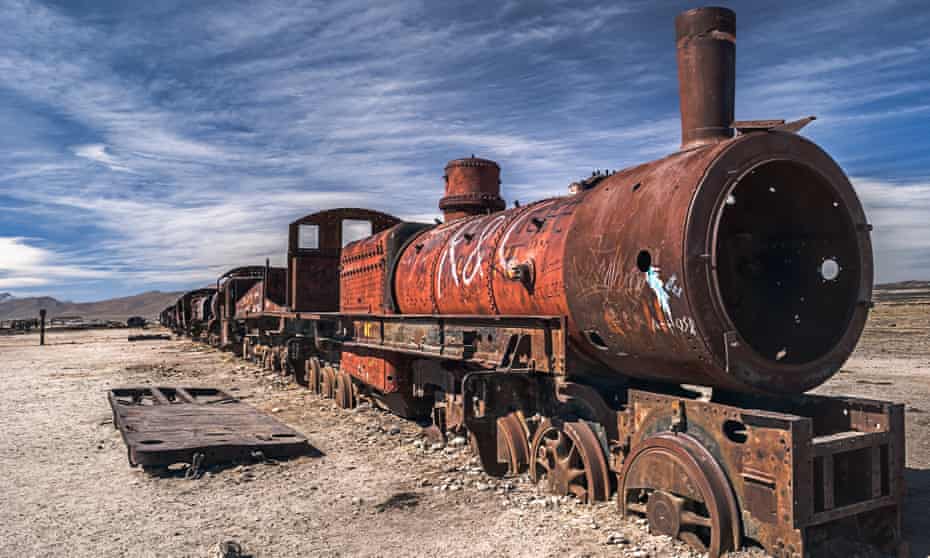The billionaire and the Bolivian train cemetery: bold epic Rare Earth Mettle

Playwright Al Smith discusses his continent-hopping new work about the climate crisis, inspired by rusting locomotives and the Lithium Triangle in the Andes
There was a worry that when theatres reopened after months of pandemic-enforced closure, programming might be risk averse, with ambitions constrained by strapped finances.
Al Smith’s Rare Earth Mettle is not a constrained play. It is a multi-stranded, multi-character, continent-hopping drama that centres on the Bolivian salt flats but encompasses numerous plotlines and locations. It was commissioned pre-pandemic – they were midway through rehearsals when theatres closed in March last year – but the Royal Court has remained committed to bringing it to the stage.
Smith’s protagonist, Hershel Fink, is an Elon Musk-esque billionaire who believes he can save the world by building electric cars. He’ll get richer in the process of course, which he’s fine with. Local indigenous communities also want to benefit from the deal.
Smith had wanted to address climate change, but he felt that a lot of the theatre that did so either took the form of a lecture – Katie Mitchell’s Ten Billion, for example – or had a dystopian approach. Neither of those routes appealed.
He had been reading about the Lithium Triangle, a region of the Andes that is thought to hold around 54% of the world’s lithium reserves, and he started reading up on the politics and history of the region and about mineral rights. Struck by the image of the train cemetery in Uyuni, a series of rusting British locomotives sitting amid the salt flats, he thought it was a great place to start a story: “an arresting, bright empty space”.

Smith is married to an NHS doctor and some of their conversations about the mental and physical health of the nation made it into the play. Gradually, he says, these different ideas and images coalesced, connections formed: lithium, as well as being a component of batteries, is also a mood stabiliser.
The play, says Smith, forces you to take a position where benevolent technocracy is the solution to the climate crisis; he doesn’t agree with that himself, but it’s intended as a provocation. “I don’t know if I have enough faith in people to change our behaviour in a way that is rationally best for the planet.”
The play is also interested in ideas of language – it is full of instances of meaning being lost in translation – and in history, both cultural and personal. Fink has tried to detach himself from his past. “He sees it as somehow getting in the way of his grand messianic view.”
As he was writing, Smith asked himself: “Does it need to be this big? Should I cut a strand? And I resisted it.” The Royal Court never told him to restrict the play for reasons of scale or cost. “That is a wonderful gift to be given as a writer.” It’s being directed by Hamish Pirie who has a rich visual approach – he put a ball-pit on stage for Tim Price’s Teh Internet is Serious Business and a flock of live goats in Goats by Syrian playwright Liwaa Yazji.
While Smith is grateful to be back in the rehearsal room, he’s acutely aware that you can’t just pick up where you left off. The world has undergone a collective trauma and the pandemic is far from over. While theatres are now playing to full capacity audiences, he’s aware of the increasing case rate and remains cautious, perhaps more so than most. As well as being a doctor, his wife is also a cancer patient and they were shielding throughout lockdown.

Smith studied English at the University of Edinburgh. His first major play, Harrogate – a two-hander about a complicated father-daughter relationship and sexual role play – premiered at the High Tide festival in Aldeburgh and transferred to the Royal Court. He has also written for Holby City and EastEnders, as well as five series of Radio 4’s Life Lines about an ambulance dispatch worker played by Sarah Ridgeway, who also starred in Harrogate. Smith spent some time at the South Western Ambulance Service Trust in Exeter, listening in on calls.
He speaks with passion about the creative possibilities of radio drama. “It’s something which doesn’t receive a lot of press. I love the medium but it’s getting hammered. The cuts in radio drama have been massive.”
Rare Earth Mettle is about power and apathy, he says. Fink asks people to save the world by allowing him to absorb all the risk. Which is nuts, says Smith, but “when you have that kind of ludicrous intellectual hypocrisy at the highest level, I don’t know how anyone can be trusted to take a rational line about anything”.
Sometimes, he adds: “I question whether the things I write are too absurd, but then I remember the secretary of state for culture ate bollocks on television for money. Rome is definitely burning.”